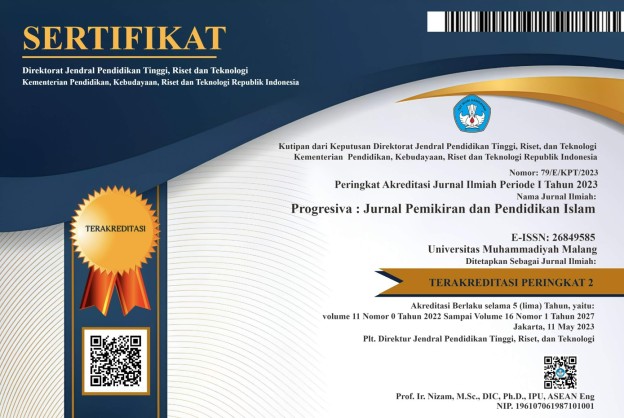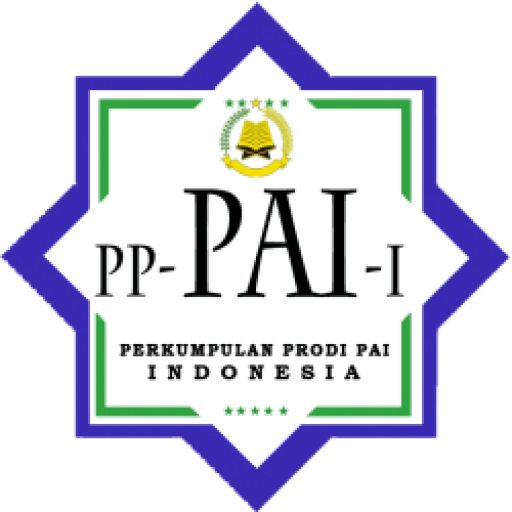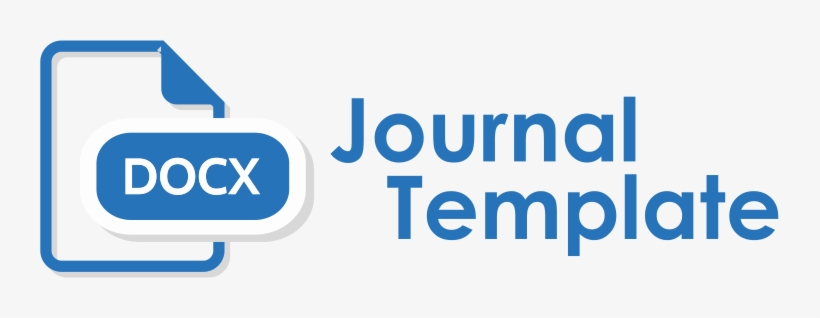The Curriculum of Islamic Religious Education in the Whirlwind of Independent Education and Its Implementation on Learning
DOI:
https://doi.org/10.22219/progresiva.v12i02.29415Keywords:
Curriculum, Independent Education, Islamic Religious Education, LearningAbstract
The curriculum is an important tool in the learning process that should provide guidance and direction for educational performance. Islamic religious education as an effort to internalize fundamental, social, and moral values, urgently needs an effective and efficient curriculum. This research is a Library Research with literature studies related to the Islamic religious education curriculum and Independent Learning. The data analysis technique used is content analysis by categorizing data so that it can be formulated based on the problem under study. The collected data is analyzed by analytical descriptive methods. The approach used is a qualitative approach where the data is in the form of narratives or sentences, and this data is processed systematically to produce conclusions. This research is also a type of historical-philosophical research. The results showed that, first, the Islamic Religious Education curriculum in the vortex of independent education became a challenge in itself, where the rapid development of science and technology, changes in education ministry regulations that hinted at independent education, and the demands of the industrial revolution 4.0. Second, the implementation of the Islamic Religious Education curriculum in Independent Learning education must be adjusted to include the values of science and technology, social values, culture, and the demands of the industrial revolution 4.0. especially after the Covid 19 pandemic which has changed the paradigm of Islamic religious education.
Downloads
References
Akrim, A. (2022). Transformation of Islamic education curriculum development policy in the national education system. Cypriot Journal of Educational Sciences, 17(7), 2538–2552. https://doi.org/10.18844/cjes.v17i7.7685
Akrim, A., Setiawan, H. R., Selamat, S., & Ginting, N. (2022). Transformation of Islamic education curriculum development policy in the national education system. Cypriot Journal of Educational Sciences, 17(7), 2538–2552. https://doi.org/10.18844/cjes.v17i7.7685
Badriah, S., Handayani, D., Mahyani, A., & Arifin, B. S. (2023). Learning Islamic Religious Education with Muhammadiyah Nuances in Universities. Tafkir: Interdisciplinary Journal of Islamic Education, 4(2), 255–273. https://doi.org/10.31538/tijie.v4i2.401
Elihami, E., & Melbourne, M. (2022). The Trend of “Independent Learning Independent Campus”: Teaching Model of Islamic Education through bibliometrics mapping in 2021-2022. Journal of Innovation in Educational and Cultural Research, 3(2), 86–96. https://doi.org/10.46843/jiecr.v3i2.70
Fabietti, M. (2022). Channel-independent recreation of artefactual signals in chronically recorded local field potentials using machine learning. Brain Informatics, 9(1). https://doi.org/10.1186/s40708-021-00149-x
Famularsih, S. (2022). Curriculum Development Management of International Class Program (ICP) in Islamic Higher Education in Indonesia. Eurasian Journal of Educational Research, 2022(100), 158–173. https://doi.org/10.14689/ejer.2022.100.011
Felsenthal, I. (2023). How to Read the Quran in Religious Islamic Education: What Educators Can Learn from the Work of Mohammed Arkoun. Religions, 14(1). https://doi.org/10.3390/rel14010129
Gallagher, M. (2023). State Islamic universities and education curriculum reform. In Islam, Education and Radicalism in Indonesia: Instructing Piety (pp. 227–252). https://doi.org/10.4324/9781003269229-14
Habibi, M. M. (2022). Intepretasi Dan Implikasi MBKM Terhadap Pengembangan Kurikulum Program Studi Pendidikan Agama Islam UII. https://doi.org/10.20885/tarbawi.vol15.iss2.art7
Halim, Abdul, M. (2023). Perencanaan Strategis Pendidikan Agama Islam Dalam Meningkatkan Mutu Pendidikan Pada Madrasah Aliyah Qur’an Centre Kota Batam Kepulauan Riau. Didaktika: Jurnal Kependidikan, vol 12(3), 203–214. https://www.mendeley.com/catalogue/be377b62-177f-3c0a-838d-80412b2dae07/?utm_source=desktop&utm_medium=1.19.8&utm_campaign=open_catalog&userDocumentId=%7B4862361d-53cf-4323-871c-3d454c64b834%7D
Halim, A., & Alpi, M. A. (2023). Peninggalan Kesultanan Islam Di Tanah Melayu Sebuah Pembaruan Pendidikan Islam Dan Tamadun Melayu. Arriyadhah, XX(2), 49–55. http://jurnalstaiibnusina.ac.id/index.php/ary/article/view/208
Halim, A., & Amril, M. (2022). Kurikulum Pendidikan Agama Islam Dalam Pusaran Problematika Kelompok Reformis/Modernis Dan Implementasinya Terhadap Pembelajaran. Arriyadhah, 20, 21–31. https://www.mendeley.com/catalogue/e5494572-b4f4-3d67-b455-14a1f7143f15/?utm_source=desktop&utm_medium=1.19.8&utm_campaign=open_catalog&userDocumentId=%7B7d3895c3-5d1b-4013-bc44-2130a13ac78e%7D
Husein, S., Nik Abdullah, N. M. S. A., & Al-Hidabi, D. A. Y. (2022). Enhancing the Development of Students’ Islamic Identity in Islamic Higher Education. Progresiva : Jurnal Pemikiran Dan Pendidikan Islam, 11(02), 87–103. https://doi.org/10.22219/progresiva.v11i02.23094
Irawan, Hary Priatna, Neng Gustini, H. M. (2023). Facing Global Challenges and A New Post Pandemi Era in Indonesia : Curriculum Changes And Innovations in The 1 Introduction Globalization has caused Indonesia ’ s national education goals to become commodities. Revista De Geastao Social E Ambiental, 17(16), 1–16. https://doi.org/https://doi.org/10.24857/rgsa.v17n7-025
Irawan, B., & Eneng Nunuz Rohmatullayaly. (2023). The Jatinangoriense Herbarium as Learning Innovations within the Independent Learning Independent Campus (MBKM). Khizanah Al-Hikmah : Jurnal Ilmu Perpustakaan, Informasi, Dan Kearsipan, 11(1), 128–137. https://doi.org/10.24252/kah.v11i1.cf2
Jumaeda, S. (2022a). Evaluating the Effectiveness of Islamic Religious Education Learning in Implementing the 2013 Curriculum in Madrasah. Jurnal Pendidikan Islam, 8(1), 101–112. https://doi.org/10.15575/jpi.v8i1.19017
Jumaeda, S. (2022b). Evaluating The Effectiveness of Islamic Religious Education Learning in Implementing The 2013 Curriculum in Madrasah. Jurnal Pendidikan Islam, 8(1), 101–112. https://doi.org/10.15575/jpi.v8i1.19017
Kamalia, P. U., & Andriansyah, E. H. (2021). Independent Learning-Independent Campus (MBKM) in Students’ Perception. Jurnal Kependidikan: Jurnal Hasil Penelitian Dan Kajian Kepustakaan Di Bidang Pendidikan, Pengajaran Dan Pembelajaran, 7(4), 857. https://doi.org/10.33394/jk.v7i4.4031
Kamaludin, M. (2021). Malang City Urban Community’s Perception towards Religion and Islamic Education. Progresiva : Jurnal Pemikiran Dan Pendidikan Islam, 10(2), 87–98. https://doi.org/10.22219/progresiva.v10i2.18164
Khalili, S. (2022). Characteristics of human agency in liberal and Islamic religious education based on the national core curricula of Finland and Iran. British Journal of Religious Education, 44(1), 53–65. https://doi.org/10.1080/01416200.2021.1874874
Kolb, J. (2023). Muslim diversity, religious formation and Islamic religious education. Everyday practical insights into Muslim parents’ concepts of religious education in Austria. British Journal of Religious Education, 45(2), 172–185. https://doi.org/10.1080/01416200.2021.1911787
Li, C., & Wei, L. (2023). Anxiety, enjoyment, and boredom in language learning amongst junior secondary students in rural China: How do they contribute to L2 achievement? Studies in Second Language Acquisition, 45(1), 93–108. https://doi.org/10.1017/S0272263122000031
Miao, C. (2022). Learning Forgery Region-Aware and ID-Independent Features for Face Manipulation Detection. IEEE Transactions on Biometrics, Behavior, and Identity Science, 4(1), 71–84. https://doi.org/10.1109/TBIOM.2021.3119403
Miswanto, & Halim, A. (2023). Inovasi Dalam Kurikulum Pendidikan Islam untuk Meningkatkan Karakter dan Etika Siswa. Journal on Education, 06(01), 17279–17287. https://www.mendeley.com/catalogue/c27b914f-175e-322b-bd86-d13dd9923cb4/?utm_source=desktop&utm_medium=1.19.8&utm_campaign=open_catalog&userDocumentId=%7Bf92f2786-a97f-4e05-9db8-22d3bf21c0af%7D
Muhajir, A. (2020). Approach to the development of multicultural education curriculum in darul hikmah modern Islamic boarding school Tulungagung, Indonesia. Universal Journal of Educational Research, 8(5), 1842–1847. https://doi.org/10.13189/ujer.2020.080520
Nasir, M. (2020). Reconstructing distinction pattern of science education curriculum in Indonesian Islamic Universities: An integrated paradigm for science and religion. Journal of Turkish Science Education, 17(1), 11–21. https://doi.org/10.36681/tused.2020.10
Ni’mah, M., & Sari, N. (2022). The Development Of Higher Education Curriculum Referrings To Free Curriculum Framefor Independent Learning (Mbkm) With The Integrative-Multidicipliner Paradigm Twin Towers Model. POTENSIA: Jurnal Kependidikan Islam, 8(1), 61. https://doi.org/10.24014/potensia.v8i1.16037
Pandiangan, P. (2023). Practicality and Effectiveness of the Physics Independent Learning (PIL) Model Toolkit in Online Tutorials to Improve Physics Independent Learning Skills and Physics Problem-Solving Skills. Jurnal Penelitian Pendidikan IPA, 9(5), 4008–4014. https://doi.org/10.29303/jppipa.v9i5.3711
Prastowo, A. I. (2020). The Independent Learning Curriculum Concept of Imam Zarkasyi’s Perspective in Pesantren for Facing the Era of Society 5.0. In ACM International Conference Proceeding Series. https://doi.org/10.1145/3452144.3452147
Puspitasari, M., & Nasihin, I. (2021). Implementation of The Village Government’s Internal Control System Through Independent Learning Programs: Integrated Independent Campuses. Jurnal AKSI (Akuntansi Dan Sistem Informasi), 6(2), 167–175. http://journal.pnm.ac.id/index.php/aksi/article/view/94/139
Putkonen, N., & Poulter, S. (2023). Balancing Differences through Highlighting the Common: Religious Education Teachers’ Perceptions of the Diversity of Islam in Islamic Religious Education in Finnish State Schools. Religions, 14(8). https://doi.org/10.3390/rel14081069
Rashed, H. (2015). Towards a common ground: Arab versus Western views about challenges of Islamic religious education curriculum of the twenty-first century. Compare, 45(6), 953–977. https://doi.org/10.1080/03057925.2014.932247
Ridwanulloh, M. U., Huda, S., & Umam, R. (2022). Innovative Leadership Management: The Pattern of School Quality Development at SMP Muhammadiyah 2 Inovasi Malang. Progresiva : Jurnal Pemikiran Dan Pendidikan Islam, 11(01), 25–42. https://doi.org/10.22219/progresiva.v11i01.20742
Rizk, H. (2021). Device-independent cellular-based indoor location tracking using deep learning. Pervasive and Mobile Computing, 75. https://doi.org/10.1016/j.pmcj.2021.101420
Sa’diyah, M., Nurhayati, I., Endri, E., Supriadi, D., & Afrianto, Y. (2022). The Implementation of Independent Learning Independent Campus: The New Paradigm of Education in Indonesia. Journal of Educational and Social Research, 12(4), 289–299. https://doi.org/10.36941/jesr-2022-0114
Siahaan, C., Simatupang, S., Simanjuntak, F. N., Iswari, L. N., Waruwu, S. R., & Lumbantoruan, J. H. (2023). The Impact and Benefits of the Independent Curriculum Learning Independent Campus during Online Learning in the COVID-19 Period. Tadbir : Jurnal Studi Manajemen Pendidikan, 7(1), 47. https://doi.org/10.29240/jsmp.v7i1.5567
Suhayib. (2023). Design of Islamic Religious Education: Purposes, alignment of curriculum components and contexts. British Journal of Religious Education, 45(4), 382–393. https://doi.org/10.1080/01416200.2023.2220940
Susilowati, E. (2022). Implementasi Kurikulum Merdeka Belajar Pada Mata Pelajaran Pendidikan Agama Islam. Al-Miskawaih: Journal of Science Education, 1(1), 115–132. https://doi.org/10.56436/mijose.v1i1.85
Sveshnikova, S. A., Skornyakova, E. R., Troitskaya, M. A., & Rogova, I. S. (2022). Development of Engineering Students’ Motivation and Independent Learning Skills. European Journal of Contemporary Education, 11(2), 555–569. https://doi.org/10.13187/ejced.2022.2.555
Ulum, F. B., Halim, A., & Oktanovia, M. A. (2023). Pengembangan Pembelajaran Pendidikan Agama Islam Berbasis Integrasi Islam Dan Sains Perspektif Hadis. Arriyadhah, XX(2), 79–89. http://jurnalstaiibnusina.ac.id/index.php/ary/article/view/223
Wakhidah, N. (2022). Examining environmental education content on Indonesian Islamic religious curriculum and its implementation in life. Cogent Education, 9(1). https://doi.org/10.1080/2331186X.2022.2034244
Wakhidah, N., & Erman, E. (2022). Examining environmental education content on Indonesian Islamic religious curriculum and its implementation in life. Cogent Education, 9(1). https://doi.org/10.1080/2331186X.2022.2034244
Yaqin, H. (2021). Influence of Image-building, Financial Stability and Curriculum development on Education Management with Moderating effect of Educational Leadership: An Islamic Perspective. Eurasian Journal of Educational Research, 2021(94), 422–443. https://doi.org/10.14689/ejer.2021.94.19
Yaqin, H., Hartati, Z., Salabi, A., Bahri, S., & Mizani, H. (2021). Influence of Image-building, Financial Stability and Curriculum development on Education Management with Moderating effect of Educational Leadership: An Islamic Perspective. Eurasian Journal of Educational Research, 2021(94), 422–443. https://doi.org/10.14689/ejer.2021.94.19
Yasin, A. F., Chakim, A., Susilawati, S., & Muhammad, S. H. (2023). Development of Islamic Religious Education Learning in Forming Moderate Muslims. Tafkir: Interdisciplinary Journal of Islamic Education, 4(1), 22–36. https://doi.org/10.31538/tijie.v4i1.227
Downloads
Published
How to Cite
Issue
Section
License
Copyright (c) 2023 Abdul Halim, Helmun Jamil, Miswanto Miswanto, Ita Tryas Nur Rochbani

This work is licensed under a Creative Commons Attribution-ShareAlike 4.0 International License.


















